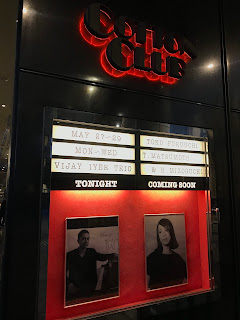Vijay Iyer Trio at Cotton Club, May 29th 2019
The jazz trio of piano, bass and drums is considered by some as the primal and cornerstone of jazz ensembles. The piano, acting as the lead voice, fills up the spaces anchored by a rhythm section that also contributes with solos at times. The three musicians ought to form an almost telepathic synergy that translates into an everflowing cascade of ideas and, in the ideal settings, a parallel to the human experience with emotions ranging from melancholy to euphoria. It might sound corny, but it’s basically the closest representation in music of the balance between heart and mind.
In the last ten years or so, the name of Vijay Iyer has been added to the historical pantheon that includes people like Bill Evans, Oscar Peterson, Keith Jarrett, and Brad Mehldau. Besides teaching in Harvard, Iyer has accumulated a significant number of awards. He has been named Artist of the Year multiple times in publications such as DownBeat and Jazz Times. He’s also one of the few jazz artists recipient of the MacArthur Fellowship Genius Grant. This was only his second visit to Japan and he played six sets at the Cotton Club in Marunouchi.
For this brief residency he was joined by Stephan Crump on bass, Iyer’s collaborator for the past 20 years and Jeremy Dutton on drums, who was replacing both Marcus Gilmore, drummer in all of the Trio recordings, and the original announced Tyshawn Sorey, another MacArthur Fellow recipient and brilliant composer on his own. The three musicians took the stage at nine sharp and Iyer announced that since this was their last set they were going to make sure this will be the best.
If things started a bit rough, with Dutton flubbing the landing after some of his breaks on the first number, the situation was remedied promptly and after those initial slight missteps the musicians started to gel and continued the path onto the aforementioned synergy.
Iyer’s background (PHD in music cognition and studies of math and physics in Yale) might be a factor in his continuous exploration of rhythm. In his version of Mystic Brew the band starts laying a solid funk groove that slowly progresses into an asymmetrical one. This meticulous process is based on the Fibonacci Sequence, as explained in Iyer’s essay Strength in numbers: How Fibonacci taught us how to swing. In another more traditional sounding jazz number heard tonight, the ratio of bars of ensemble playing vs. bars of instrumentalist solo kept shrinking until near the end, to the point that Dutton will solo for half a bar and they all play together for the other half. These experiments on time signature were fascinating and added a dash of a cerebral approach to the music.
Stimulating the mind was not the only thing in play. The balance with the emotional aspects was achieved whenever they reached resolution. There was a dramatic sense of tension and climax attained throughout the whole set, aided by those terrific chord sequences that Iyer puts together. It was no surprise that the musicianship was top-notch. On center stage Crump laid down some amazing solos and every time he reached for his arch you knew the band was going to take you on a journey. Iyer’s left hand is a perfect indication of the importance of the beat in his music, it was steadily grooving even during the most complex solo passages. Same with Dutton’s drumming, at times going for the snare on the 2nd and 4th beat in a somewhat rocking approach.
The seventy five minutes set flew by rather quickly. Most of it comprised of songs from the latest Trio album Break Stuff. I could hear traces of Taking Flight and Mystery Woman. The tunes were mostly played in a suite manner, which means with hardly any pauses in between. At the end John Coltrane’s Countdown served as background for the reintroduction of the musicians on stage and everything got to a close with Iyer solo on piano and a last high register note. The audience kept applauding long after the lights went up, but unfortunately there was no encore. Nobody left unsatisfied, though. This evening we witnessed a terrific display of complex and yet accessible contemporary jazz of the highest order.
Thank you for reading. Please follow me on Twitter for updates at @ConcertTokyo. You can also click the Like button and get notifications at The Tokyo Concert Experience on Facebook.





Comments
Post a Comment